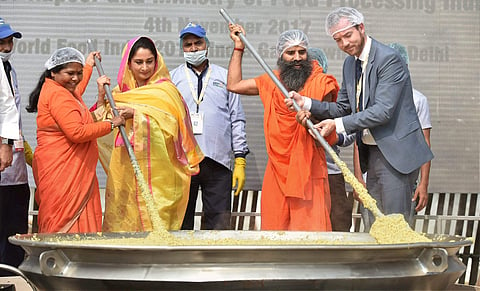

Khichdi will be served in the canteen, girls please maintain discipline, the speaker bellowed. The bell rang, a rhythmic screech followed by silence before all hell broke loose. As the cement grounds filled with pinafores and double plaited shrieks, a snakish line of girls from different backgrounds, beliefs and languages formed in front of a steaming huge vessel.
In middle school, we were all asked to eat khichdi as part of a government scheme. In spite of having a tiffin box, my heart took some joy in the yellow sticky rice-dal mixture, often served with a twang of grain, the kind that seemed like it had just seen release after it had been locked for years in a dark godown. My love lasted maybe a few months before I grew tired of it.
Khichdi, throughout India, ranges in flavours, seasoning and the way it is cooked. Harsimrat Kaur Badal's statement that stirred up a storm over now a national dish for a diverse country was well, a khichdi of sorts. A steamy mix pulled out and well-seasoned with spices from various states and religions and dumped onto the hot-plate.
"Enough Khichdi cooked up on a fictitious 'National Dish?. It has only been put for a record entry in #WorldFoodIndia," she posted on Twitter, late on Wednesday evening.
Watch the people of Chennai play a guessing game that turned into a Khichdi. Now that's some nationalism:
While the sea of tweets and social media posts regarding the "misunderstanding" varied, it was the democratic spirit that was wounded — if only till the misconception lasted. While many defended the various forms of the gruel, others questioned the government, and not without reason.
At a time when even the national animal is far from protected and the national sentiment restricted to a few, it is but inevitable that the idea of a national dish can evoke such a flurry of emotions and responses.
My flatmate, a native of Tamil Nadu, brought up in Maharashtra, made Khichdi many-a-night. Her recipe was what her mother had passed onto her, who possibly had it passed on from her mother. It knew no race, boundary or limit and spread from generation to generation, broke through caste, creed and even mental limitations. After a grueling day at work, a tired Malayali girl devoured it.
Why is it that we are so focused on associating national pride and respect to material things at a time when it is emotion and sentiment that must be prioritised? Why is the government not focusing on empathising people on brotherhood, unity, forgiveness, compassion and the diversity that for years has been the country's stamp globally?
As Khichdi comes off its three-day pedestal as "India's brand food" on Saturday, we need to decide whether we want it to remain a burst of flavours on our palate or let it spoil into an issue strongly rooted in Indian plates, from the north all the way down south.
(The writer's views expressed here are her own. You can tweet to her at @mia_kuruvilla)
